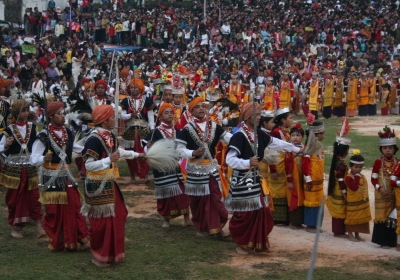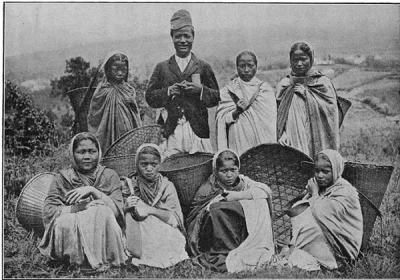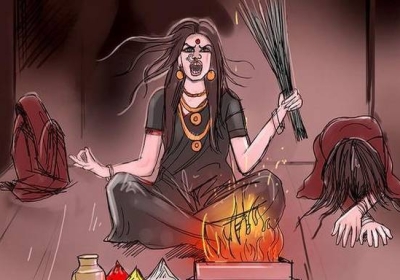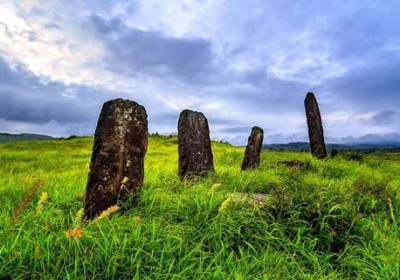KHASI MATRILINEAL CLAN LINEAGE : THE CLAN KINSHIP
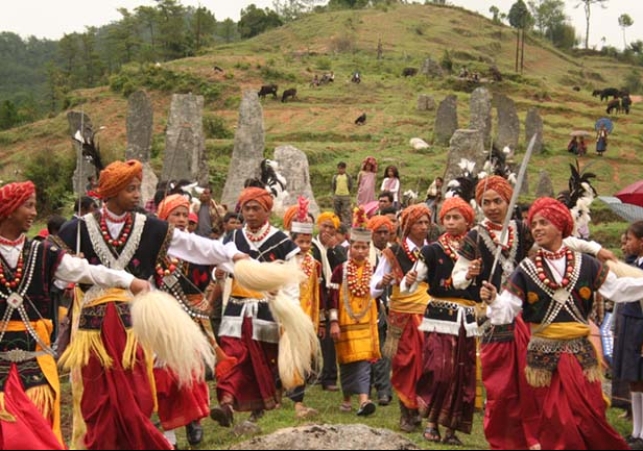
(For every human, the male person as a husband ejaculates his sperm into the reproduction organ of his wife and the job is done, whence the subsequent duty is to work and earn provisions for nourishment of the body of every member in the family. The mother has to bear the burden of caring and concern for the embryo inside the womb for ten lunar months until it matures and sets to give birth to a healthy infant, usually with severe physical and mental suffering. Thereafter, the mother has to breastfeed the infant for months and sometimes a few years for proper nourishment until he or she is weaned away and fed with adult food. Each child is attached to the mother for a minimum of three years for physical and emotional care and nourishment during the prenatal and postnatal period. It is in the womb of the mother that the baby grows and matures, and given birth, and further in the bosom of the mother that the infant grows and develops in the various stages of physical and psychological maturity. It is only when the child grows into a young boy or a young girl that they assert for independent movement, even as they rely on both parents for emotional and physical needs until they became adolescents. At this period both the mother and father, besides other elderly relatives are responsible for counselling and shaping the life and character of their young siblings. The stage between adolescence and before they become a young man or woman is very crucial because they would have attained puberty and valid for reproduction. The domestic and social consideration is another aspect that the children needs to be guided in the proper direction of adult life, before they prepare to engage in matrimony. It is justified that the clan lineage should be the legitimate rights of the biological mother taken into consideration the constant attachment with physical and emotional involvement with her children. Even biological sciences substantiated that mitochondrial DNA cells are originated from the lineage of the mother only, while nuclear DNA cells bears the combined identity of both mother and father.
It is to be understood that the biological mother is the only person to acknowledge as the real mother of the children that she bore. An infertile man or woman can not assume parentage status in Khasi concept. )REPETITION
There is no consideration for foster mother or stepmother in Khasi custom and usage, because the children are essential to taking the lineage from their biological mother. There are fateful instances of orphans, but there is no system of orphanage because the clan kinship structure is held responsible by tradition to take care of the unfortunate persons of the same maternal family or clan. Even adoption should be within the children of sisters in the maternal family or clan kinship. In this regard, beggars are rarely present in Khasi society, because every clan is mandatory to provide care and custody of the fellow members of their clan that might encountered any adversity. Nevertheless, foster parents are available on compassionate consideration, even as the original clan of the adopted children is retained a new clan may be adopted for minors when they are grown up.)
The clan bondage in Khasi society is firm and facilitated into the emergence of social a unit within the particular clan with the formulation of kinship organisation. Almost every clan constituted a kinship group among the maternal clan members. However, most of these kinship organisations are more concern with social welfare activities and obtaining position in traditional institutions, while the essence of folk custom and practices are being neglected. Therefore, most of the kinship organisations conduct like voluntary associations and on certain occasions like a privileged group of influential people to promote their own vested interest. There are instances where the clan members might be expelled if they asserted dissent or rebel against the leadership with doubtful credentials. On the other hand, there are instances where the alien persons might be included in the organisation based on frivolous claim of clan affiliation, even if they belong to other community, provided they lobby with lucrative proposition for the group or leadership. In this case, the underprivileged are more vulnerable to exclusion. This is a dangerous trend for the sustainability of the traditional practices and may tantamount to taboo and forbidden marital relationship according to customs.
The original clan kinship structure is in the form of traditional institution with the proper council headed by clan elders and constituted by the representative maternal uncles from every clan in a particular province. Usually the provincial council is constituted by the original inhabitants belonging to certain privileged clans, while the other clans may hold the position of territorial head at their respective region. The maternal uncles from each household are unanimou heads at the clan council. Some segments of certain clans elected one elder as territorial representative at the provincial council and these elders were nominated as nobles headed by the chieftain. The conventional practice at every household is usually represented by the eldest uncle as the (domestic elder)head of the family, otherwise any matured member of the family may be selected from the family and on rare occasions the mother may assume as domestic elder in the absence of eligible male members. If the situation demands, female heads might be elevated into a noble at the provincial council, but such circumstances rarely occurred. Thus the democratic principle is inclusive of any male or female mature elder to represent through the household, the clan or the territory, even though traditionally the eldest maternal uncle is the accepted head because the youngest daughter is to take the duty of the custodian of family properties.
The maternal family council comprised of the mother as the chief custodian and her eldest brother, the mama (if you write mabah then it means maternal grandmother’s brother) as the supreme authority for every domestic affair, in consultation with all the matured members within the family. In every family, the daughters after marriage are required to set up a separate home and become the chief custodian of their respective household, except for one daughter, preferably or by conventional practice, the youngest daughter is supposed to continue the legacy of her mother,while the sons are the maternal uncles for every new family and exercise the role of management of the domestic affairs of each household. The mother, as the chief custodian, would allocate certain properties for each daughter with the endorsement of her granduncle or her eldest brother, as resolved in the family council. This is the democratic process for management of domestic affairs, and the granduncle would represent the family at the clan council along with other maternal uncles within the clan. Thereafter, the maternal uncles from the clan council would constitute territorial councils from among the representatives of the clan council and conduct the affairs of their respective regions within the territory. Then the representative maternal uncles from various territories belonging to different clans would be nominated at the provincial council as elders and nobles that would be assigned with respective administrative and religious affairs. The provincial council is headed by the chieftain and the royal ceremony is at the behest of the queen mother as the custodian of the royal domestic council. The queen mother would consult the reigning chieftain, who could be her son or brother, whichever is the case for all the affairs of the religious ceremony, which is performed for the general welfare of the entire province and its citizens. The visitors or strangers that inhabited the province, which migrated from other neighbouring provinces, are included as subjects and might be allowed to participate in the ceremony with the endorsement of the provincial council. Even the communities of different ethnic identity from the adjacent areas who desire to merge for political protection might be considered as subjects and granted permission to participate in the ceremony with the approval of the provincial council. This is an inclusive method of political administration with effective implementation of customary law to safeguard the legitimate citizens from incursion by the subjects. Further, the siblings bore out of the intercommunity marriage with the subjects are considered as legitimate citizen through established traditional customs and rituals.


